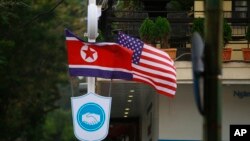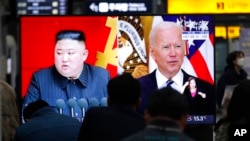With denuclearization talks with North Korea stalled and missile tests accelerating, some experts are wondering whether Washington should offer high-level, person-to-person talks to re-engage Pyongyang to end the current stalemate and de-escalate tensions.
“The U.S. should consider any type of engagement that will help restart diplomatic talks aimed at peace and denuclearization, including senior-level official meetings,” said Frank Aum, a senior expert on North Korea at the U.S. Institute of Peace.
Harry Kazianis, a senior director at the Center for National Interest, said, “Offering high-level talks is an easy way to try and convince the North Koreans Washington is serious about talks.”
The Biden administration is facing criticism that its approach to North Korea is not working as Pyongyang ratchets up tension while ignoring Washington’s offer of talks without preconditions.
Pyongyang conducted 11 missile launches in January, setting a record for a single month. It also raised the possibility of restarting nuclear or intercontinental ballistic missile tests and bragged that it is the only country that can use its weaponry to strike the U.S.
Stalemate amid tensions
Talks with Pyongyang deadlocked in October 2019 after a working-level meeting held in Stockholm to save the failed summit in Hanoi dissolved without progress.
The Hanoi summit held in February 2019 between former President Donald Trump and North Korean leader Kim Jong Un broke down when Trump rejected Kim’s demand for full sanctions relief in exchange for partial denuclearization.
Critics at the time slammed Trump for meeting with Kim, first in Singapore in June 2018 and then in Hanoi, without securing a concrete denuclearization deal. Trump was also often criticized for exchanging what he frequently hailed as “beautiful” personal letters with Kim.
But with diplomacy stalled, North Korea watchers around the world are wondering if Trump-style, person-to-person diplomacy should be retried to reengage Kim.
A survey of 250 Pyongyang watchers by NK News found nearly half of 82 respondents voted Trump’s summit diplomacy with Kim as “the best decision by Washington during the Kim Jong Un era.”
High-level engagement
Similarly, some experts think Washington should try what Trump tried — sending a letter — to jump-start the talks, while holding off any leadership summits until nuclear envoys hammer out a denuclearization deal.
“A letter from Biden to Kim may provide Kim the level of seriousness and respect he is looking for while also not undermining any red lines that the Biden administration has set, such as a premature summit or providing sanctions relief upfront,” said Aum.
“It is probably prudent to hold off on a summit until the two sides can confirm that actual progress has been achieved,” Aum added.
Scott Snyder, director of the program on U.S.-Korean policy at the Council on Foreign Relations, said sending North Korea “a letter or an emissary are plausible options.” He said Kim “seeks evidence of seriousness of purpose from the U.S.” on its offer for talks.
Other experts think the U.S. should not try Trump-style, top-down diplomacy leading with a summit.
Bruce Klingner, senior research fellow for Northeast Asia at the Heritage Foundation, said, “President Trump’s approach to North Korea — engaging in summit meetings with no prior substantive progress or preparation — was an aberrant from standard U.S. diplomacy and should not be followed.”
Klingner continued, “The United States should not offer senior-level meetings or even presidential correspondence without some indication that North Korea is receptive to dialogue.”
Failed approach
Evans Revere, a former State Department official with extensive experience negotiating with North Korea, said, “The issue is not the level of dialogue.”
Revere continued, “Washington has not ruled in or out any particular level of engagement. The issue is North Korea’s lack of interest in engagement either with Washington or Seoul. North Korea does not seem to want talks at this point. Rather, Pyongyang wants concessions, mainly from the United States, on sanctions and the so-called ‘hostile policy.’ ”
Patrick Cronin, the Asia-Pacific Security Chair at the Hudson Institute, said, “The impasse in diplomacy between North Korea and the United States is not the level of dialogue.”
Cronin added that Kim “would undoubtedly like President Biden to invite him to a summit where they would announce a reduction in hostilities and the removal of major sanctions. Because he knows that is unlikely to happen soon, he is happy to avoid meaningful diplomacy altogether.”
Responding to a VOA Korean Service inquiry on whether Washington should consider a new diplomatic push involving a high-level official to engage Pyongyang, the State Department continued to express its openness to meeting with North Korea without preconditions.
A State Department spokesperson on Thursday said, “We remain hopeful the DPRK will respond positively to our outreach.” The DPRK stands for North Korea’s official name, the Democratic People’s Republic of Korea.
Journalist Jiha Ham contributed to this report, which originated with VOA’s Korean Service.






